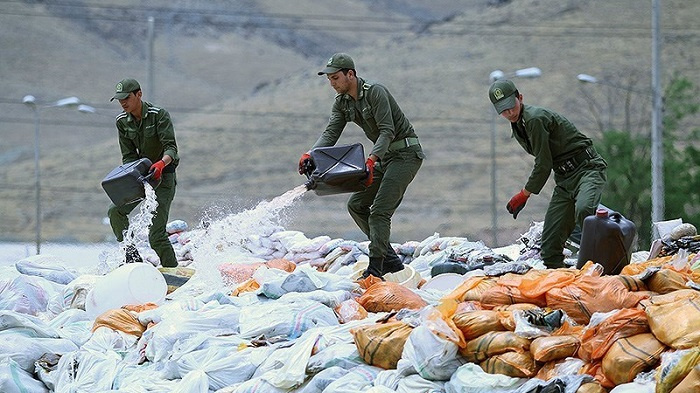Iran to eliminate death penalty for some drug offences, saving about 5000 lives

(Soldiers pour gasoline before fire is set on narcotics confiscated from drug traffickers. Photo: Nima Najafzadeh/Tasnim)
Iran is loosening its grip on drug traffickers and mules in the hope to focus on cartels, as it also wants to dissuade the West from pressing the country on human rights issues.
A long-time debate over death penalty for certain drug-related crimes in Iran is seemingly coming to an end. Four months ago, Iranian lawmakers approved a single-urgency motion to reform the country’s anti-narcotics act, a legislation that could remove hundreds from the death row.
On Monday, the parliament’s legal and judicial committee passed amendments to the act that sets new conditions for mules to be sentenced to death. According to the parliamentary committee spokesman Hojjat al-Eslam Hassan Norouzi, executions will be limited cases where the convict is armed, used children or adolescents under 18, or has had criminal records of over 15 years. The ex post facto amendment could save up to 5000 convicts, who have been waiting death since 2011.
This could be an end to an ongoing debate over the deterrence of capital punishment among different Iranian authorities in recent years. In an interview with Fars News Agency, Saeed Safatian, an expert on drug trafficking, said that despite years of executing death penalties, the number of smugglers has increased. Safatian who has served in various governmental bodies concerned with the fight against drugs agrees with the elimination of capital punishment, says the punishment should be reserved for chieftains of international trafficking network and those who get involved in armed fights. “I believe long-time prison sentences without parole and leave could lead to more deterrence,” he added.
The country’s Drug Control Headquarters (DCHQ) has a similar take on the matter. DCHQ spokesman commented on the elimination of death penalties, saying the headquarters agrees with the elimination of capital punishment for minor smugglers. “We believe the executions should move from quantitative toward qualitative,” he added. Iran’s President heads the DHCQ and the Interior Minister serves as the secretary-general. While the Interior Minister Abdolreza Rahmani-Fazli also serves as the Supreme Leader’s representative in the country’s police department, the police takes a very different stance. In his latest presser, the police spokesman Saeed Montazer al-Mahdi said laws such as capital punishment have been deterrent and should not be eliminated. “Law Enforcement Force of the Islamic Republic insists on the continued enforcement of these regulations,” he added.
After a year-long quandary, the Judiciary is finally backing a reconsideration. Deputy Judiciary Chief Gholam-Hossein Mohseni Eje’ei told reporters this week that it is alright for the Judiciary, the administration, and NGOs to want to investigate the deterrence of capital punishment adding, “Merely claiming that the executions have not worked is not well-researched and could increase smuggling”. According to Eje’ei, over 44 percent of prisoners in Iran have been directly involved in smuggling or selling drugs while 70 percent of the total number of prisoners have been convicted for felony indirectly concerning drugs.
Last but not least is the country’s main authority in human rights issues, the Judiciary’s Human Rights Council (HRC). Last October, HRC head Mohammad-Javad Larijani told Brazilian newspaper O Estado de Sao Paulo that 93 percent of executions in Iran are related to drug convicts. “I personally advocate reforms into laws, but do not believe that there should be a permanent halt in executions; we have 800 km of border with Afghanistan, where the growing of opium spiked 40 times after the invasion of NATO,” he added. According to the interview republished in Tasnim, Iran spends an annual amount of $200 m in fighting drug cartels. “Iran should not be left alone in fighting these cartels. We should bolster the fight through receiving aid from international bodies to modernize facilities. A second issue is the review of laws. The executions should be limited to major gang leaders. This will immediately decrease the number of executions, which is on agenda," Larijani stressed.
Iran has been a leading player in the global fight against drugs. However, neighboring Afghanistan, one of the largest producers of conventional drugs, Iran has suffered an ever-worsening epidemic of substance abuse in the 21st century. Tough punishments including death penalty for traffickers have been a last resort.
Efforts to minimize the number of death penalties for drug-related offences is in part encouraged by foreign pressure. In the latest series of his warnings, UN’s former Special Rapporteur on the situation of human rights in Iran Ahmed Shaheed called on Iran to halt execution of 12 individuals for drug offences in August. He said in a news release that drug-related crimes do not meet the threshold of the ‘most serious crimes’ as required by international law, especially the International Covenant on Civil and Political Rights, to which Iran is State party. Shaheed had reported that Iran’s could top 1000 in 2015. If ratified, the amended act on punishment of drug trafficking could lead to a sharp drop in this number.

